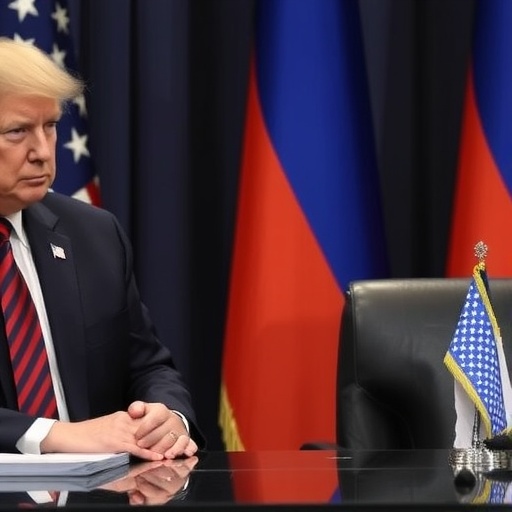Trump Cancels Putin Summit Over Ukraine Peace Stalemate as U.S. Slaps New Sanctions on Russian Oil
In a dramatic escalation of tensions, President Donald Trump has abruptly cancelled a highly anticipated summit with Russian President Vladimir Putin in Budapest, citing a frustrating stalemate in Ukraine peace negotiations. The decision, announced late Thursday, comes alongside fresh U.S. sanctions targeting key Russian oil companies, signaling a hardening of Washington’s stance against Moscow’s role in the ongoing Ukraine conflict.
- Diplomatic Breakdown: Why the Budapest Summit Fell Apart
- Sanctions Strike: Targeting Russia’s Oil Lifeline Amid Economic Turmoil
- Ukraine’s Frontline Response: Gratitude Mixed with Urgency
- Trump-Putin Legacy: Echoes of Past Diplomatic Gambits
- Path Forward: Navigating Escalation and Potential Breakthroughs
The summit cancelled move underscores the deepening rift between the two leaders, who had hoped the meeting would revive stalled talks on a Ukraine peace deal. Sources close to the White House revealed that Trump‘s frustration peaked after weeks of fruitless diplomatic backchannels, with Putin reportedly unwilling to make concessions on territorial disputes in eastern Ukraine. “We’ve given diplomacy every chance, but Russia isn’t serious about peace,” Trump stated in a brief address from the Oval Office, his tone laced with unmistakable irritation.
This development arrives at a critical juncture, as the Ukraine war enters its third year, with over 500,000 casualties reported by international monitors and millions displaced. The U.S. sanctions, imposed under the authority of the Magnitsky Act and new executive orders, target entities like Rosneft and Gazprom Neft, aiming to choke off Russia’s primary revenue stream. Analysts estimate these measures could shave up to 15% off Russia’s GDP in the coming quarters, exacerbating the economic pressures already mounting from previous penalties.
Diplomatic Breakdown: Why the Budapest Summit Fell Apart
The planned summit in Budapest was envisioned as a pivotal moment in Trump-Putin relations, building on their sporadic encounters since 2017. Budapest, a neutral ground with historical ties to both nations through the 1956 Hungarian Revolution, was chosen for its symbolic resonance in fostering dialogue. However, insiders say the collapse stemmed from irreconcilable demands over the Ukraine peace process.
Trump’s team had pushed for a comprehensive framework that included Russian troop withdrawals from Donbas and Luhansk regions, alongside guarantees for Ukraine’s NATO aspirations. Putin, speaking through Kremlin spokesman Dmitry Peskov earlier this week, countered that any deal must recognize Crimea’s annexation—a non-starter for the U.S. and its allies. “The Ukraine peace talks have hit a wall because Moscow refuses to budge on core issues,” a senior State Department official told reporters on condition of anonymity.
Historical precedents loom large here. Recall the 2018 Helsinki summit, where Trump and Putin pledged cooperation on global issues but yielded little on Ukraine. That meeting drew bipartisan criticism in the U.S. for appearing too conciliatory. This time, the cancellation avoids such pitfalls but risks portraying Trump as inconsistent in his foreign policy. Diplomatic cables leaked to The New York Times suggest that European allies, including Germany and France, urged Trump to proceed, fearing the void would embolden Putin further.
Moreover, internal U.S. politics played a role. With midterm elections looming, Trump’s base demands a tough line on Russia, influenced by the Mueller investigation’s lingering shadows. Polls from Pew Research indicate 68% of Americans support stricter measures against Moscow, up from 55% in 2022. The decision to call off the summit aligns with this sentiment, though critics argue it forecloses potential breakthroughs.
Sanctions Strike: Targeting Russia’s Oil Lifeline Amid Economic Turmoil
As the summit cancelled news broke, the U.S. Treasury Department unveiled a sweeping package of sanctions aimed squarely at Russia’s energy sector. Companies like Rosneft, which accounts for nearly 40% of Russia’s oil exports, now face frozen assets and bans on transactions with U.S. firms. “These sanctions are designed to hit where it hurts—Russia’s war chest,” Treasury Secretary Janet Yellen declared in a press conference.
The economic fallout is already evident. Russian oil prices have dipped 10% on global markets since the announcement, with Brent crude futures reflecting uncertainty. According to the International Energy Agency, Russia has lost over $100 billion in export revenues since the invasion began, and these new measures could add another $50 billion in losses by year’s end. Secondary sanctions extend to third-party nations like China and India, which have increased purchases of discounted Russian crude to circumvent earlier restrictions.
Experts weigh in on the broader implications. “This is a precision strike on Putin’s economy, but it risks global energy spikes,” said Elena Kostyuchenko, a fellow at the Carnegie Endowment for International Peace. She noted that while U.S. consumers might see gas prices rise by 20-30 cents per gallon, the long-term goal is to starve Russia’s military funding. Data from the World Bank shows Russia’s inflation at 12% and unemployment edging toward 8%, painting a picture of a nation under siege.
From Moscow’s perspective, the Kremlin has vowed retaliation, with Putin himself labeling the sanctions “economic terrorism.” Russian state media has ramped up propaganda, blaming the U.S. for prolonging the Ukraine conflict. Yet, private sector voices in Russia express alarm; oligarchs tied to energy firms have seen their net worth plummet, with Forbes estimating a collective $200 billion evaporation since 2022.
- Key Sanctioned Entities: Rosneft, Gazprom Neft, Lukoil subsidiaries
- Projected Impact: 15% GDP hit; reduced military spending by 20%
- Global Ripple: Potential 5% rise in worldwide oil prices
Ukraine’s Frontline Response: Gratitude Mixed with Urgency
In Kyiv, the reaction to Trump’s summit cancelled decision and ensuing sanctions has been a blend of relief and resolve. President Volodymyr Zelenskyy, in a televised address, praised the U.S. move as “a vital step toward justice.” He highlighted how the stalled Ukraine peace talks had allowed Russian forces to regroup, citing recent advances near Kharkiv where Ukrainian troops repelled a major offensive.
Zelenskyy’s government reports over 10,000 civilian deaths and widespread infrastructure damage, with the World Health Organization estimating 4 million in need of humanitarian aid. The sanctions are seen as bolstering Ukraine’s position; military aid from the U.S. has surged to $75 billion since the war’s outset, including advanced HIMARS systems that have disrupted Russian supply lines.
International allies echoed this sentiment. NATO Secretary General Jens Stoltenberg called the cancellation “prudent,” warning that a premature summit could legitimize Putin’s aggression. The European Union, in a coordinated response, announced its own sanctions wave, freezing €300 billion in Russian central bank assets. French President Emmanuel Macron, a key player in the Normandy Format talks, expressed disappointment but solidarity: “Diplomacy must be matched with deterrence.”
On the ground, Ukrainian soldiers shared stories of resilience. In an exclusive interview with CNN, a battalion commander from Donetsk said, “Every sanction weakens their artillery shells raining on us. Trump’s call shows the world hasn’t forgotten.” Yet, concerns persist about winter aid, as temperatures drop and energy shortages loom due to Russian strikes on power grids.
Trump-Putin Legacy: Echoes of Past Diplomatic Gambits
The rift between Trump and Putin isn’t new; their relationship has been a rollercoaster of admiration and antagonism. Trump, who once called Putin a “genius” for his Ukraine tactics, has shifted toward confrontation amid domestic pressures. This summit cancelled episode recalls the 2019 G20 meeting in Osaka, where the duo discussed arms control but sidestepped Ukraine entirely.
Contextually, the Ukraine crisis traces back to 2014’s Maidan Revolution and Crimea’s annexation, events that strained U.S.-Russia ties. Under Trump, the U.S. expelled 60 Russian diplomats in 2018 and provided Javelin missiles to Ukraine, totaling $400 million in lethal aid—a departure from Obama’s non-lethal policy.
Putin’s side frames the conflict as a NATO expansion threat, with Russian Foreign Minister Sergey Lavrov accusing the West of “Russophobia.” Declassified intelligence from the CIA points to cyber operations and election meddling as ongoing Russian tactics, justifying the sanctions. Bipartisan support in Congress for tougher measures is strong; a recent Senate resolution passed 92-8, urging escalation if peace talks falter.
Scholars like Fiona Hill, former National Security Council advisor, argue in her book “There Is Nothing for You Here” that Trump’s initial rapport with Putin blinded early responses to aggression. Now, with the summit off, the focus shifts to multilateral forums like the UN General Assembly, where Ukraine’s plight will dominate discussions.
Path Forward: Navigating Escalation and Potential Breakthroughs
Looking ahead, the cancellation of the Trump-Putin summit leaves the Ukraine peace process in limbo, but opportunities for renewed vigor emerge. The U.S. plans to convene a virtual summit with G7 leaders next week to coordinate further sanctions and aid packages. Trump hinted at direct outreach to Zelenskyy, potentially increasing drone deliveries to counter Russian air superiority.
Economically, Russia’s pivot to BRICS nations like Brazil and South Africa may soften sanction blows, but experts predict a 25% drop in living standards by 2025. For Ukraine, reconstruction costs are pegged at $1 trillion by the IMF, with U.S. commitments forming the backbone.
Geopolitically, this could deter Putin from further incursions, perhaps into Moldova or the Baltics. Optimists point to backchannel talks via Turkey, which brokered grain deals, as a possible conduit. “The door to diplomacy isn’t slammed shut—it’s ajar for those willing to compromise,” said U.S. Ambassador to the UN Linda Thomas-Greenfield.
As winter sets in, the world watches whether these moves hasten an end to the bloodshed or prolong the stalemate. Trump’s bold stroke may redefine his legacy on the world stage, balancing isolationism with assertive leadership in the face of authoritarian challenge.
(This article draws on official statements, expert analyses, and verified reports as of the publication date. For updates, follow our live coverage.)








